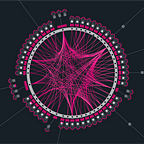The Moonsama Multiverse has undergone immense growth in recent months. Samaverse now has multiple games including Carnage, Pondsama, etc., which are played by thousands of active players. This results in a large number of transactions during the game, and it gets chaotic.
To handle the transactions efficiently, the team decided to launch their own L1 gaming chain called Exosama Network, which will be the home of all the Samaverse games. The team wanted massive throughput for the Exosama chain, so they decided to use Proof of Authority as its consensus algorithm.
In this article, we will discuss how Proof of Authority could benefit the Exosama Network. So let’s start with the overview of the PoA consensus mechanism and how this differs from Proof of Stake.
Proof of Authority
Consensus refers to the agreement of all the network validators on a common state of the blockchain. To solve the double spending problem in distributed networks, consensus mechanisms like Proof of Work and Proof of Stake were introduced.
In Proof of Stake, the validators have to put their money at stake (or stake their tokens) in order to validate blocks. In Proof of Work, the miners have to solve complex puzzles by doing computational work in order to validate blocks. Similarly, in the Proof of Authority, validators have to put their reputation at stake to validate blocks and secure the network.
The validators in the PoA network are pre-approved and selected on the basis of their reputation. The selection of validators could be decided by governance or solely on strategic partnerships. If a validator ever tries to manipulate or cheat the network, his reputation will be damaged.
PoA vs PoS
1. Validators’ selection
In PoS, the validators are selected on the basis of the amount of tokens staked, whereas in PoA, the validators are selected solely on the basis of reputation. This means the identity of a validator is public in the PoA network.
2. Number of validators
In PoS, there is no limit on the number of validators. Anyone can become a validator by staking the network’s native token. In PoA, there is a limited number of validators who are selected via governance.
3. Scalability
Since in PoS networks, there are a large number of validators, the messaging complexity is high, and thus the network is less scalable. This is because the transactions are being verified by a number of validators. Whereas in PoA, the validator count is limited, and the messaging complexity is very low, resulting in high scalability.
4. Decentralization
PoS networks are decentralized as anyone is free to join the network by staking tokens. But in the case of PoA networks, there is a limited number of pre-approved validators, which makes it centralized.
PoS chains are prone to centralization when a whale acquires a significant stalking share, but its iteration nominated-Proof of Stake fixes all the centralization vulnerabilities.
5. Token Inflation
To secure a network in a PoS network, the validators receive staking rewards in the network’s native token. Thus, the tokens of a PoS chain are inflationary in nature. On the other hand, there is no such incentive in case of a PoA network, and therefore the tokens are not inflationary.
6. Examples
Blockchains using the PoS consensus mechanism include Ethereum, Cardano, Polkadot, Thorchain, etc. And the chains using the PoA consensus are Hedera Hashgraph, Energy Web, VeChain, etc.
So these were all the major differences between the PoS and PoA consensus mechanisms. Now let’s discuss how the launch of Exosama Network could impact $poop.
How will $poop get impacted?
Exosama Network will be the home of all Samaverse games and NFT projects. The governance rights will be given to the holders of the Samaverse NFT project, including Moonsama, Exosama, and Pondsama. Exosama Network will have $exn as its native token, which means all the network fees will be paid in this token.
Pros
- The great thing is that $exn will not be minted out of thin air. Instead, the $poop token will be converted at 1:1 into the $exn via metaverse refineries. This means all the supply of $exn will come from burning of the $poop token. This is a huge utility for the $poop token.
- Since Exosama Network uses Proof of Authority, the native token will have zero inflation due to staking. This is very beneficial as it would prevent the sell pressure from inflationary supply.
Cons
- Using PoA, the network at the initial stages will be centralized. But there’s something called progressive decentralization. When the Exosama Network will be fully developed, the team can at anytime switch to a more decentralized Proof of Stake consensus mechanism.
Remember, Polkadot also started as PoA but as the development proceeded, they switched to Proof of Stake.
Final Thoughts
To handle a larger number of transactions, making a gaming chain is a great idea in my opinion. This would provide the required throughput and the transactions would be economically feasible.
The governance however remains decentralized as it is the Samaverse NFT holders who will participate in the governance proposals and vote on the future of Exosama Network.
Important Links
Raresama website: https://raresama.com/
Moonsama wiki: https://wiki.moonsama.com/
Follow me on Twitter: Prophet Dotsama
